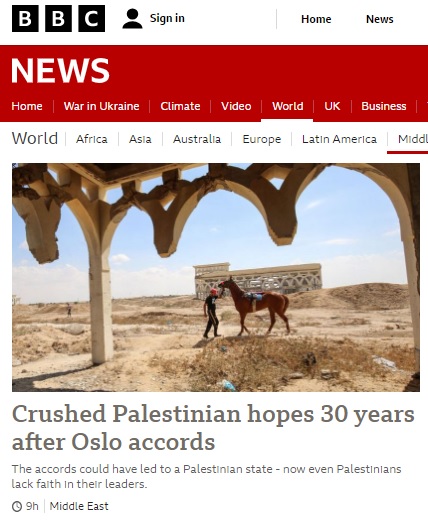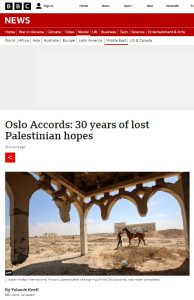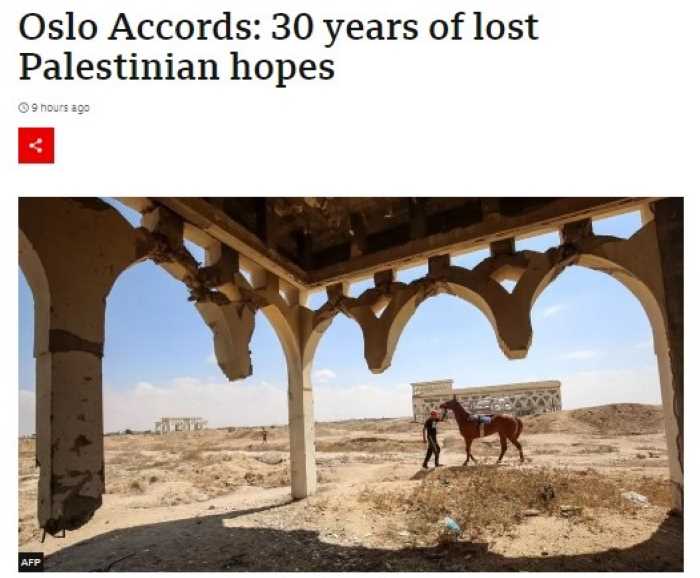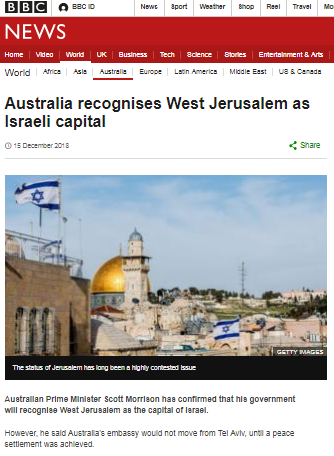Early on the morning of September 13th the BBC News website published a report by Yolande Knell of the BBC’s Jerusalem bureau which was presented as follows:

Headlined “Oslo Accords: 30 years of lost Palestinian hopes”, Knell’s entirely one-sided account of the situation on the 30th anniversary of the signing of the Oslo Accords does not include any mention whatsoever of “crushed” or “lost” hopes on the Israeli side which, in those thirty years, has seen over 1,700 of its citizens murdered in Palestinian terror attacks.
The main image illustrating Knell’s report is captioned:
“Yasser Arafat International Airport, opened after the signing of the Oslo accords, was never completed”.
Readers are however told nothing more about the reasons for the closure of that airport which, notably, was the topic of a BBC report in September 2018 around the time of the 25th anniversary of the signing of the Oslo Accords:
BEHIND A BBC NEWS VIDEO ON GAZA AIRPORT
Knell’s report opens as follows: [emphasis added]
“It is the 30th anniversary of the breakthrough Oslo Accords between Israel and the Palestinians. The peace deal led to the creation of the Palestinian Authority, intended to provide interim self-government for just five years while negotiations solved outstanding core issues in the conflict. Today, nearly a decade after peace talks collapsed, the PA remains in place, but is losing its legitimacy.”
Later in her long article, Knell returns to the topic of the 2013/14 negotiations:
“Although negotiations were later brokered by the US, they achieved little; the last round fell apart in 2014.”
Like her Jerusalem bureau colleague Tom Bateman in a report published a week earlier, Knell refrains from clarifying to readers that the 2013/14 negotiations “collapsed” and “fell apart” because the Palestinian side announced a reconciliation deal between Fatah and Hamas.
Knell tells her readers that:
“As far as Palestinians were concerned, the PA was supposed to be replaced with an elected government, running their own independent state in the West Bank and Gaza Strip, with its capital in East Jerusalem. That dream has become ever more distant.”
As we have all too often had cause to point out when the BBC has promoted similar claims, the Oslo Accords in fact make no mention of the two-state solution or an “independent” Palestinian state. They certainly did not dictate that the end-product of negotiations would be a Palestinian state “in the West Bank and Gaza Strip, with its capital in East Jerusalem”.
That was made clear by Martin Indyk, the former U.S. ambassador to Israel, in an article marking the 25th anniversary of the agreements in which he wrote: [emphasis added]
“The Oslo process was supposed to have provided the blueprint, with its requirement for a series of confidence-building interim steps that would help Israeli and Palestinian leaders absorb the political costs of the difficult compromises needed finally to achieve peace. The Oslo Accords did not spell out those compromises; they did not provide for a Palestinian state, nor for a solution for Jerusalem, which both sides seek as their capital, nor for the Palestinian refugees who claim a “right of return.” They only provided that the final-status issues were to be negotiated and concluded within five years of the signing.”
Knell also tells readers that:
“At the time the Oslo Accord was signed in 1993, there were just over 110,000 Jewish settlers living in the West Bank, including East Jerusalem. Today, the figure is more than 700,000. Settlements are seen as illegal under international law but Israel has always disputed that.”
She refrains however from informing BBC audiences that the Oslo Accords did not place any restrictions on construction in Israeli communities in Area C and the future of that territory was defined in those agreements as being subject to final status negotiations. Knell’s insertion of the standard BBC mantra concerning ‘international law’ as ever conceals from audiences the existence of legal opinions which do not conform to the corporation’s chosen narrative.
The Oslo Accords do, however, oblige the Palestinian Authority to combat terrorism and violence: a fact which Knell fails to note when she uncritically promotes the following talking points:
“Meanwhile, the PA – dominated by the Palestinian President’s Fatah faction – is weak and lacks initiatives to force Israel to stop expanding on land wanted for a future Palestinian state. It is corrupt and authoritarian and often seen as a tool of Israel’s occupation.
There is huge resentment at how PA security forces co-ordinate with the Israeli army to arrest Palestinians allegedly planning attacks against Israelis.”
As is overwhelmingly the case in BBC reporting, Knell’s portrayal of history begins in June 1967, with no mention of the 19-year illegal Jordanian occupation of Judea & Samaria and parts of Jerusalem or the inclusion of those areas – and the Gaza Strip – in the territory allocated by the League of Nations for the creation of a Jewish homeland:
“After Israel captured the West Bank and Gaza from Jordan and Egypt in the 1967 Middle East War, its military governors ruled the territories directly. Meanwhile, East Jerusalem was annexed to Israel in a move that was not internationally recognised.”
She continues:
“As a result of the Oslo Accords, leaders of the Palestine Liberation Organisation (PLO) – newly recognised by Israel as the legitimate representative of the Palestinian people – returned from exile abroad. The PLO had renounced terrorism and recognised Israel’s right to exist in peace.”
Knell fails to clarify to readers that the Palestinians continue to reject Israel’s right to exist as the Jewish state and makes no attempt to explain how her claim that the PLO “renounced terrorism” lines up with the fact that terrorists from PLO member organisations continued to carry out attacks against Israelis in the years immediately following the signing of the Oslo Accords, during the second Intifada and to this day. Palestinian terrorist organisations belonging to factions which are not party to the PLO such as Hamas are absent from Knell’s portrayal despite the effects of their actions on the outcomes of the Oslo Accords.
Having failed to make any mention of the 269 Israelis murdered in terror attacks in the six years following the signing of the Oslo Accords, Knell jumps straight to a whitewashed portrayal of Camp David and recycles a myth long promoted by the BBC concerning Ariel Sharon’s pre-coordinated visit to what – using PLO approved terminology – she describes as “the al-Aqsa Mosque compound”.
“The collapse of peace talks at Camp David in 2000 was followed by Palestinian fury when Israel’s opposition leader visited Jerusalem’s most sensitive holy site – the al-Aqsa Mosque compound, known to Jews as Temple Mount – seeking to promote Israeli sovereignty there.
The deadly violence of the second Palestinian intifada, or uprising, then left the peace process in tatters and strengthened the hawkish Israeli right-wing.”
A caption to one of the photographs illustrating Knell’s report tells readers that “Israeli checkpoints restrict Palestinians’ movement”, similarly without clarifying that checkpoints came into existence because of Palestinian terrorism.
Knell tells her readers that:
“The last parliamentary elections held in 2006 were won by Fatah’s bitter rival, the Islamist party, Hamas, which is committed to the destruction of Israel. Efforts to form a unity government that the world could accept ultimately failed and in 2007, Hamas seized full control of Gaza, after days of deadly inter-factional fighting. It continues to rule there and the damaging internal political rift persists. Parliament remains suspended.”
However, she refrains from any serious discussion of the question of how agreements signed by a body – the PLO – which does not represent the Palestinian people as a whole could bear fruit or to what extent the “lost hopes” of the Palestinians are to product of their own dysfunctional leadership and internal rivalries.
The interviewees quoted and promoted by Knell in this report include the former PLO legal advisor Diana Buttu, who appears fairly frequently in BBC content – including just a week earlier in Tom Bateman’s report – despite her long record of promoting falsehoods in the media. Additional contributors are Fatah loyalist Sabri Saidam, Palestinian pollster Khalil Shikaki and several vox pop Ramallah residents.
It is therefore hardly surprising that Knell’s long but entirely one-sided article does little to help BBC audiences understand the part played by the Palestinians themselves in failing to bring an end to the conflict. She makes no effort to seriously examine the question of how factors such as Palestinian terrorism – and the related PA funding of terrorists – or Palestinian education have affected the chances of bringing the conflict to an end because her portrayal of the failure of the Oslo Accords and subsequent negotiations is as narrative driven as her tepid portrayal of the factors that lie behind current wave of violence.
Related Articles:
BBC AGAIN VISITS TERRORISTS IN JENIN, PROMOTES ONE-STATERS – PART ONE
BBC AGAIN VISITS TERRORISTS IN JENIN, PROMOTES ONE-STATERS – PART TWO






Knell is merely a dumb tool of the BBC/Iran conspiracy to erase Israel from the map. She is commissioned to write biased articles intended to to turn world opinion against Israel – regardless of the fact that Israel is there to stay and such silly articles simply encourage Israel to beef up its security against the PA.